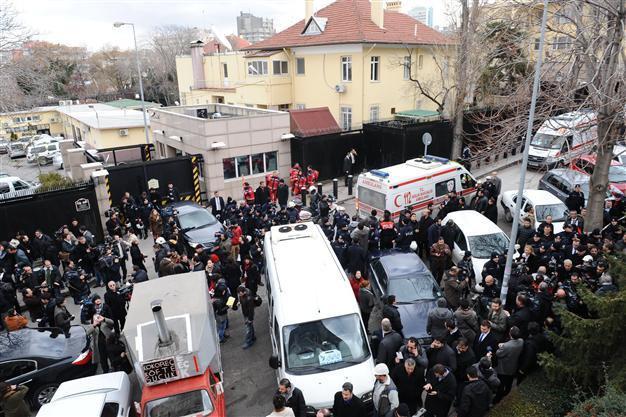Analysis: Cold War-style proxy war via US Embassy
NİHAT ALİ ÖZCAN ISTANBUL - Hürriyet Daily News

Daily News Photo / Selahattin Sönmez
I must say I wasn’t surprised by the news of a terrorist attack at the U.S. Embassy in Ankara. Any careful observer of regional developments and political culture could have predicted events escalating to a terrorist attack. Accordingly, I wrote several analyses along these lines in my column for the Hürriyet Daily News.The history of terrorism in Turkey is voluminous. In line with the Cold War classification, right-wing and left-wing terrorist organizations have been active for a long time. But I believe a more accurate classification for our times is as follows: Ethnic, sectarian and jihadist; three kinds of terrorist groups that are currently active. Jihadist groups are active in Turkey as they are all around the world. They continue to regard Turkey as a potential site for taking action. Nowadays their priority is jihad in Syria, which might have led them to postpone their activities in Turkey. This does not mean that Turkey and western targets in Turkey are off the jihadists’ list.
The second group involves ethnic terrorism. This is best exemplified by the outlawed Kurdistan Workers’ Party or the PKK, that is, Turkey’s classical problem of terrorism. Although the PKK is the organization that introduced suicide attacks in Turkey and is at the top of the list of effective suicide attacks, the current political situation does not point to its involvement in the attack.
The final usual suspect is of sectarian character. Although the Marxist terrorist organizations of the Cold War have ended their activities in Turkey, organizations of the sectarian sort like the DHKP/C (Revolutionary People’s Liberation Party/Front) have been gaining ground as a result of circumstances surrounding the Syrian civil war. For example, the historical background, sectarian character and ideological motivation of this organization points to a strong connection to Syrian Intelligence.
Moreover, suicide bombing is one of its known tactics. It’s not surprising at all that the suspect behind this attack is a member of this organization.
In sum, it seems that Syrian President Bashar al-Assad has sent a message to the United States of America, a message that reverberated through the house of its long-time friend Turkish Prime Minister Recep Tayyip Erdoğan. There is a strong sign that a new proxy war in the region has started. Just like the days of the Cold War, Syria-Iran-Russia and the West confront each other.
















